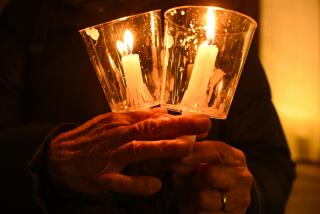Uncomfortable Dilemma for a PLO Supporter : Kuwait’s Welcome to Palestinians Turns Cool
- Share via
KUWAIT — The neighborhood of Hawalli in Kuwait stands apart from its neighbors. Instead of the gleaming white villas with irrigated gardens common in much of the city, Hawalli has the ramshackle look of peeling beige apartment buildings brightened only by rows of washing dangled off balconies.
The Arabic accents outside a bakery on Tunis Street seem more familiar to Nablus in the Israeli-occupied West Bank than here on the edge of the northern Persian Gulf. Even the pastries displayed inside on huge, round trays are redolent of the aromas of far-off Jaffa and Haifa.
Hawalli is one of the largest Palestinian ghettos in Kuwait. The estimated 350,000 Palestinians who now reside in the tiny sheikdom constitute one of the largest, richest and most influential Palestinian communities in the world, ranking in size only behind those in Jordan and Lebanon. Indeed, the Palestinian population is almost half as large as the number of actual Kuwaiti citizens, 739,000.
Confronted by Dilemma
With the Palestinian uprising in the Israeli-occupied territories now in its 13th month, Palestinians in Kuwait are increasingly confronted by an uncomfortable dilemma. On the one hand, Kuwait leads the Arab world in support for the uprising; on the other, it has made it apparent that it is increasingly uneasy at having such a large Palestinian population of its own.
Recently, bulldozers were at work knocking down buildings in Hawalli, part of what the government calls urban renewal of one of the city’s oldest and, indisputably, most run-down areas. To many Palestinians, though, the clearance represents the removal of affordable housing and an unambiguous shove out the door.
“They have knocked down half of the buildings in Hawalli,” said Mohammed Khalifa. “Where are we supposed to live? So people just leave.”
One Palestinian official estimated that 50,000 Palestinians have decided to emigrate from Kuwait to Jordan in recent years.
Big Fund-Raiser
By contrast, a recent fund-raiser for Palestinians in the occupied territories garnered $1.5 million in a single night; the donors were led by Kuwait’s interior minister, who personally gave 50,000 dinars, the equivalent of $200,000.
Every Palestinian employee of the Kuwaiti government gives up a 3.5% salary deduction as a tax to support the Palestine Liberation Organization. Recently, an additional day’s pay was withheld to help finance the uprising.
The uprising, or intifada as it is known in Arabic, is the prime topic of conversation here despite Kuwait’s relative remoteness from the occupied territories. Apart from the obvious family ties, the concern is fueled by images on the nightly news--edited by Palestinian expatriates--of Palestinians being shot by Israeli troops, and articles in one of the many newspapers that have substantial Palestinian input.
Kuwait has long had a special relationship with Palestinians. After the 1948 Middle East War, the oil boom was producing vast development opportunities for a country that lacked skilled manpower.
‘Important Coincidence’
“It was a historical incident of great proportions,” said Shafik N. Ghabra, a Kuwaiti of Palestinian origin who recently published a book on the Palestinian community here. “Oil was being discovered, and the land of Palestine was being dismembered. It was an important coincidence for both communities.”
Displaced Palestinian teachers arrived in Kuwait to be appointed principals of high schools, mechanics were hired as directors of garages, farmers took over agricultural projects. The history of Kuwait is a virtual catalogue of the skills of the Palestinian immigrants who fled here after 1948.
The work ethic is still so great that when Kuwaiti newspapers published the list of top high school students last year, keen-eyed readers noted only one Kuwaiti name on a list of 55, with the majority being Palestinian.
“Several hundred members of the Palestinian intelligentsia (began) to move to Kuwait immediately following 1948,” Ghabra noted in his book. “In every case the need to find employment was supreme. Personal ties, in all cases, were basic to the ability to find employment.”
Fatah Was Created in 1950s
Among those who drifted to Kuwait was an engineer named Yasser Arafat, who along with a mathematics teacher and a supermarket owner established Fatah, his so-called mainstream wing of the PLO, in the 1950s.
Khaled Hassan, a member of the Fatah Central Committee and the PLO’s information director who maintains a splendid mansion here, was quoted in a recent biography of Arafat as saying, “If Kuwait’s rulers had not allowed us the freedom to organize, there may not have been a Palestinian regeneration.”
During the 1960s, the Kuwaiti government granted the PLO unusual autonomy rights, including the administration of special PLO schools for Palestinian children. The schools were blended with Kuwaiti schools in 1976.
“The Kuwaiti policy was to support the PLO 100% in hopes of buying peace internally,” observed one Western diplomat.
Enjoys Certain Freedoms
The PLO still enjoys substantial rights here, including the rights to organize workers and to hold public meetings--a touchy issue in most Arab countries.
“At least here we can issue a magazine and hold meetings,” said Hussein abu Shanab, a Fatah official who publishes As Sakra (Dome of the Mosque) from a six-story office complex here. “In Jordan, we have no such freedoms.”
The limits of the freedom were reached last February, when Palestinian demonstrators carrying placards supporting the intifada clashed with police and more than 70 demonstrators were arrested. There have been no further incidents.
“We follow the rules,” said Fatah’s Abu Shanab. “We don’t make strikes, and we don’t demonstrate. We help the intifada in other ways as well as we can.”
The Palestinian community is so well organized that residents from each Palestinian village are grouped together to support their relatives back home.
‘Checkbooks Come Out’
“It’s a lot like what Jewish groups do in the United States,” said the American-educated Ghabra. “Wealthy Palestinians will be invited to hear a speaker, and at the end of the talk, the checkbooks come out.”
Although the uprising has served to galvanize support for the PLO and Palestinians in the occupied territories, the Palestinians in Kuwait often look upon the struggle differently than do some other Palestinian refugees, who want only to return to their homeland.
“I think it’s a matter of identity more than anything else,” said a Palestinian dentist who has been in Kuwait for 20 years. “Realistically, I am not about to give up my practice, uproot my family and move back if there is a solution next year. But I want to have an identity, just like an American expatriate knows he is American even if he lives in Paris.”
The main way in which Kuwait keeps pressure on the Palestinian community is a directive forbidding grown children, even those born in Kuwait, to return if they leave the country.
A Hard Choice
With preference given to Kuwaitis at the university, in practice this means that Palestinian students who go abroad for a university education can never return. For many Palestinian families, the choice is to never see their children again or to emigrate.
“It was definitely an economic decision because of the oil downturn,” said one Palestinian academic. “But it had a major political dimension.”
The Kuwaitis are also selectively deporting Palestinians who are regarded as a threat to national security. Last year, 37 editors of Palestinian descent at local newspapers were sent to Jordan, according to Western diplomats.
In October, Kuwaiti youths clashed with Palestinians along the seashore corniche that is a favorite with weekend strollers. The violence was never explained, but it appeared simply to reflect youthful antagonisms bursting into the open.
“There is a lot of resentment among young, uneducated Kuwaitis who envy the accomplishments of the Palestinians,” said one Western observer. “It often translates into open hostility.”
More to Read
Sign up for Essential California
The most important California stories and recommendations in your inbox every morning.
You may occasionally receive promotional content from the Los Angeles Times.













